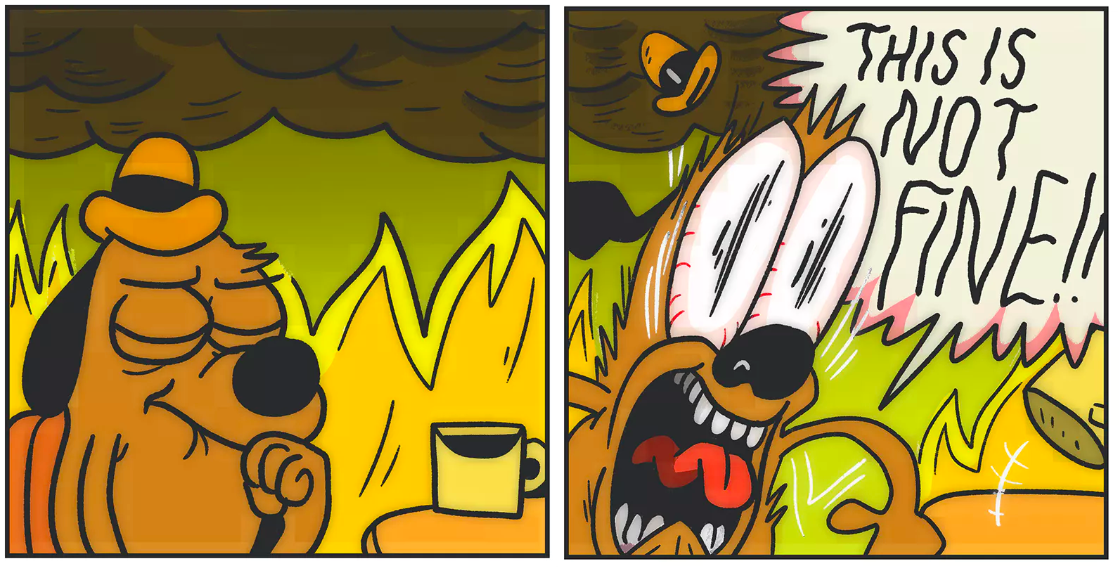Back in 2013, artist kc grəən created a webcomic called “On Fire.” It features a dog sitting calmly in a chair in front of a cup of coffee. The entire room is engulfed in flame.
He smiles and says, “This is fine.”
The next panel features the dog sipping a cup of coffee.
“I’m okay with the events that are unfolding currently,” he declares.
As he puts the coffee down, the flames burn his paw.
“That’s okay, things are going to be okay,” he says, but his smile is gone and his eyes betray some fear.
The last panel is gruesome: the dog’s face melts, resembling the scene in Indiana Jones when the Nazis meet their end after opening the Ark of the Covenant.
This past month, I’ve worried about turning into that dog.
Every time I went to write my newsletter or a new post for my blog, I couldn’t bring myself to do it. It felt so…small to talk about storytelling and marketing while the leadership of my nation and their supporters are actively complicit in the traumatization of thousands of innocent children, the discrimination against countless Muslims and refugees, the potential removal of reproductive rights, and now, the slaughter of journalists.
It feels absurd to return to business as usual while the world burns–like vacantly sipping a cup of coffee in a room engulfed in flames while saying “this is fine.”
I worry that concentrating on growing my business would equate to selfish complacency in the face of inhuman acts.
Although I’ve done my client work, it’s been with great difficulty and distraction. My heart just hasn’t been in it, and the words have been distant — like they were on the other side of a wall.
But while my heart has been sick, my mind has been reminding me that I have to continue to pay the bills, I have to continue to deliver value to my clients, and letting them down isn’t going to help anyone suffer less in this world.
So what do you do when the world leaves you wordless?
At one point, in a fit of insomnia, I decided to rewrite a project that I knew was not my best work. The words left me cold.
I was stuck in my own head.
Step 1: Reach out and get feedback
Luckily, unbeknownst to me, my partner on the project sent my draft over to her circle of copywriting experts to get feedback.
The comments she returned with were humbling. Everything they said reflected concepts that I’ve been reaching, but was too emotionally disconnected to apply: empathize with the customer’s pain, make me care, tell a story, don’t sell the offer too soon.
Their feedback gave me permission to stop compartmentalizing and breathe empathy into my work.
Step 2: Let the pain in––with compassion
The wall my mind created between my creative flow and my anxiety was built with the misplaced desire to protect the quality of my work.
But by compartmentalizing my anxiety, I was cutting myself off from an undercurrent that was essential to my creativity: my authenticity.
The anxiety I was experiencing was just as valid a resource as any other emotion that fed my creativity, like love, fear, anger and joy. The anxiety was coming from a very real place, with very real reasons: who wouldn’t be anxious during such times?
When I allowed my compassionate self to open the door to my anxiety, to invite it into my creative process rather than telling it to go back to where it came from, I not only discovered a rich source of narrative imagination from which to draw, I also took bigger risks in how I applied it to my work.
When you look your fear in the eye and say it has every right to be there, when you offer a hand to lift your fear up and guide it towards hope, your fear rewards you with a newer, stronger focus to your work.
Tear down the wall.
Unite your fear with your creativity.
They belong together.
P.S.: In August of 2016, three years after the “This is fine” comic turned into a viral meme, KC Green created this for The Nib in response to the general WTF-ery of 2016:

I think it’s safe to say KC let the pain in, gave it some guest towels and let it sleep on his couch.
Have you been feeling disconnected from your creativity during these tumultuous times? How have you coped with or worked past writer’s block?


